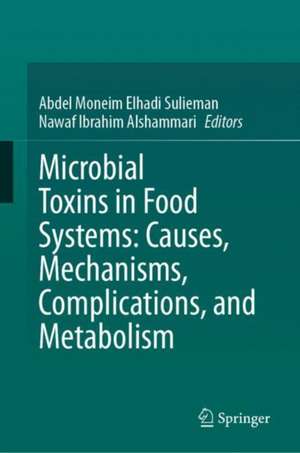Microbial Toxins in Food Systems: Causes, Mechanisms, Complications, and Metabolism
Editat de Abdel Moneim Elhadi Sulieman, Nawaf Ibrahim Alshammarien Limba Engleză Hardback – 7 oct 2024
As the title suggests, Microbial Toxins: Causes, Mechanisms, Complications and Metabolism is a comprehensive overview of the life of these toxins from their pathogenesis through to their implications for human and environmental health. Including examples of salmonella, botulism, listeria and more, as well as various mycotoxins, this text will appeal to both microbiology researchers as well as food industry professionals. Beyond foodborne illness, this text also unpacks environmental toxicology and the role of microbial toxins in the development of novel anti-cancer drugs.
Emerging techniques in the detection of microbial toxins will be discussed, setting this text apart from existing books on the subject. The use of proteomics in toxin identification, for example, allows for the determination of metabolic pathways and biomarkers of pathogenicity and resistance of biotoxins. This text furthers the study of foodborne hazards and has important implications for the improvement of safety in the food industry.
Preț: 1396.08 lei
Preț vechi: 1702.53 lei
-18% Nou
Puncte Express: 2094
Preț estimativ în valută:
267.17€ • 290.11$ • 224.42£
267.17€ • 290.11$ • 224.42£
Carte tipărită la comandă
Livrare economică 22 aprilie-06 mai
Preluare comenzi: 021 569.72.76
Specificații
ISBN-13: 9783031628382
ISBN-10: 3031628381
Pagini: 546
Ilustrații: Approx. 545 p.
Dimensiuni: 155 x 235 mm
Greutate: 0.88 kg
Ediția:2024
Editura: Springer Nature Switzerland
Colecția Springer
Locul publicării:Cham, Switzerland
ISBN-10: 3031628381
Pagini: 546
Ilustrații: Approx. 545 p.
Dimensiuni: 155 x 235 mm
Greutate: 0.88 kg
Ediția:2024
Editura: Springer Nature Switzerland
Colecția Springer
Locul publicării:Cham, Switzerland
Cuprins
Introduction: Concept, Significance and Properties of Microbial Toxins.- Toxicological Terms.- Pathogenicity Mechanisms of Bacteria.- Beneficial roles of microbial toxins.- Detection of Bacterial Toxins.- Microbial toxins degradation.- Environmental toxicology.- Bacterial Toxins: Genetics, Cellular Biology and Practical Applications.- Food Industry and Microbiological Toxins Contamination.- Proteomics as a tool for studying of microbial toxins.- Detection and Identification of microbial toxins by Proteomics Approaches.- Food Intoxication Prevention, Diagnoses, and Treatment.- Significance of bacterial toxins.- Bacterial protein toxins.- Bacterial Toxins and Human Health.- Bacterial Toxins and cancer.- Endotoxins and external bacterial toxins.- New discoveries in toxins from Gram-positive bacteria, Staphylococcus aureus.- New discoveries in toxins from Gram positive bacteria, Clostridium botulinum.- New discoveries in toxins from Gram negative bacteria Eschrichia coli.- New discoveries in toxins from Gram negative bacteria Salmonella.- New discoveries in toxins from Gram negative bacteria Vibrio Cholerae.- New discoveries in toxins from Gram-positive bacteria, Listeria monocytogenes.- New discoveries in toxins from Campylobacter.- Mycotoxins, producing fungi, types and properties.- Aflatoxins Occurrence, Toxicity Effects and Degradation.- Ochratoxins Toxins.- Zearalenone Toxins.- Mushroom poisons.- Patulin Toxins.- Citrulline Toxins.- Algal toxins.- Viral Toxins.- Implications of Mycotoxins in Food Safety and Regulations.- Bacterial toxins in the management of colon cancer Current perspective.
Notă biografică
Dr. Abdel Moneim Elhadi Sulieman is a full professor in the Department of Biology in the Colle of Sciences at University of Hail, Kingdom of Saudi Arabia. In his career, he has served as an editor on 20 academic texts.
Dr. Nawaf Ibrahim Alshammari is an associate professor in the Department of Biology in the Colle of Sciences at University of Hail, Kingdom of Saudi Arabia.
Dr. Nawaf Ibrahim Alshammari is an associate professor in the Department of Biology in the Colle of Sciences at University of Hail, Kingdom of Saudi Arabia.
Textul de pe ultima copertă
When food items become contaminated with pathogenic microorganisms, these microorganisms secrete microbial toxins which promote infection by attacking the host tissue’s immune system, thereby leading to foodborne intoxication, or poisoning, in consumers. Because these toxic microorganisms are not typically identifiable by taste, smell or sight, it is crucial to the safety of our food systems that they be detected through microbial testing.
Microbial Toxins in Food Systems: Causes, Mechanisms, Complications and Metabolism is a comprehensive overview of the life of these toxins from their pathogenesis through to their implications for human and environmental health. Including examples of salmonella, botulism, listeria and more, this text will be of immense value to microbiology researchers as well as food industry professionals. Beyond foodborne illness, this text also unpacks environmental toxicology and the role of microbial toxins in the development of novel anti-cancer drugs.
Emerging techniques in the detection of microbial toxins will be discussed, setting this text apart from existing books on the subject. The use of proteomics in toxin identification, for example, allows for the determination of metabolic pathways and biomarkers of pathogenicity and resistance of biotoxins. Microbial Toxins in Food Systems: Causes, Mechanisms, Complications and Metabolism furthers the study of foodborne hazards and has important implications for the improvement of safety in the food industry.
Microbial Toxins in Food Systems: Causes, Mechanisms, Complications and Metabolism is a comprehensive overview of the life of these toxins from their pathogenesis through to their implications for human and environmental health. Including examples of salmonella, botulism, listeria and more, this text will be of immense value to microbiology researchers as well as food industry professionals. Beyond foodborne illness, this text also unpacks environmental toxicology and the role of microbial toxins in the development of novel anti-cancer drugs.
Emerging techniques in the detection of microbial toxins will be discussed, setting this text apart from existing books on the subject. The use of proteomics in toxin identification, for example, allows for the determination of metabolic pathways and biomarkers of pathogenicity and resistance of biotoxins. Microbial Toxins in Food Systems: Causes, Mechanisms, Complications and Metabolism furthers the study of foodborne hazards and has important implications for the improvement of safety in the food industry.
Caracteristici
Appeals to both researchers and industry Provides a comprehensive overview of the life of microbial toxins Discusses emerging techniques in the detection of microbial toxins
